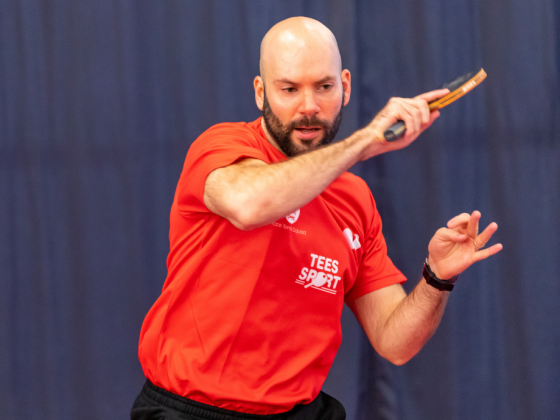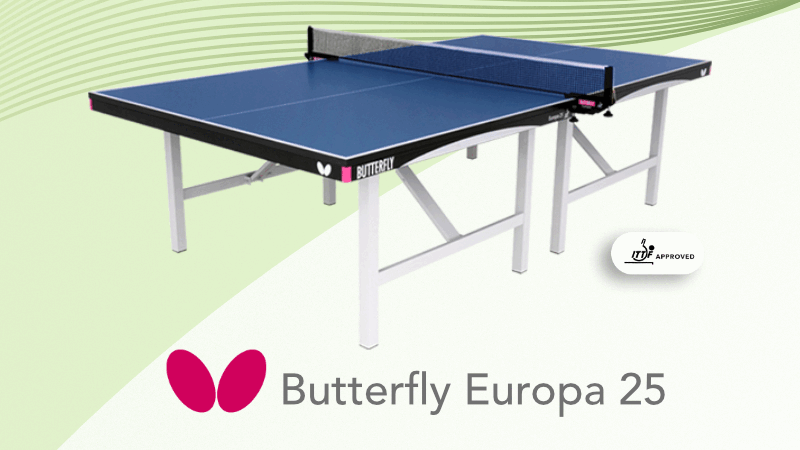The purpose of this blog is to give some insight to fellow coaches as to what’s involved in a specific training camp, the issues, successes, concerns that may arise and how I dealt with them. It also gives me a great opportunity to review my own delivery and actions, as well as help the players plan for the rest of the season, once they return home from the European Youth Championships. I also hope that reading this helps you consider some of the areas of your delivery, in and away from the hall.
My objective from the six days of training we had planned in Italy, was to work towards creating rapport among the team, as well with them as individuals. If I was able to do that, then I felt we would be able to focus more on the table tennis elements once we were in competition.
24th-30th June 2022 – Centro Tecnico Federale, Terni, Italy
24th June – Day 1
We had a late flight out to Rome but planning ahead and anticipating poor traffic (Friday and train strikes), I set off at 11am for a leisurely drive and an early arrival. However, that quickly turned into a slow and stressful journey, and I eventually arrived at Stansted airport close to 17:00. However, as I gave myself plenty of time, I arrived in plenty of time. As soon as I arrived, it was important that I say ‘hello’ to all the players, parents and coaches, as I also see an importance in building rapport with the wider team.
We headed through to departures, grabbed some food, planned a little, flew at 19:45 landed around midnight and arrived at the Italian National Training Centre around 2am. We checked in and headed straight to bed.
25th June – Day 2
We’d planned a later breakfast for the players (9:00/9:30am) due to the late arrival and we’d also planned a slightly later and laid back first practice (11:00am). The first session was amongst ourselves, as the Italian team(s) were due to arrive later on that day. So, it was an opportunity for us to see how the players interacted with each other, how they trained with each other and a chance for them to get used to the humid playing conditions. We sectioned the training into our respective team and started to spend a little more time together.
After lunch (all food was provided by the centre and it was exceptional, which always makes a trip much easier) the Italians arrived and we had an afternoon session within our respective age groups. So, Cadet boys and girls from England and Italy would all train together. Although we were operating in the same hall, we worked to a boy / girl split most of the time. We started off by alternating exercises (I would choose an exercise and the Italian girls’ coach would choose an exercise). This system seemed to work well and it tended to be something that we’d stick to most of the time. Again, the majority of the day was a bit of a feeling-out process, us coaches working out how to best work together, the players trying to figure each other out, to overcome some language barriers and getting used to the various personalities in the room. Again, all great life skills for the young players to practise. Shortly after, we would get ourselves ready and head to dinner and call an end to the first full training day.
26th June – Day 3
I could start to see that the girls had good discipline and understanding of what I asked of them, which is always good to see. They would meet me 5 minutes before we were due to meet, for the morning run and breakfast etc., and they would always come together as one unit.
After breakfast I felt it was important to sit down with them and express what I believed their goals should be, whilst on this preparation camp. My personal opinion was that they should not be looking for big improvements here, their level is their level and that has been determined by the time and work they’ve put in over the course of the season. So, we sat down and talked about improving little things if we can but the bulk of the conversation was readying them for all eventualities. It’s very common (across all sports) for athletes to have a suboptimal performance at a big Games but for them to also understand that doesn’t have to equate to poor results. I wanted them to be ready to deal with them playing poorly, playing okay or playing really well.
The morning session started with a ‘warm-up’ for all players, which was led by a fitness coach from the Italian team. I say ‘warm-up’ as it wasn’t a traditional warm-up but more of a conditioning session. It was incredibly useful to see and it was clear to see that our players were behind in this area. The areas covered every morning were, core strength and stability, coordination, agility work, plyometric work and flexibility, for around 40 minutes. From my perspective, I could see the benefit of spending time on some of these areas and that we perhaps do not spend enough time creating this type of focus for our players.
Afterwards, we would head straight into our session where the girls would play against the Italian Cadet girls. Again, we stuck to the format of alternating exercises between the Italian coach and myself. I planned to start the sessions off with some more open, consistency, feel-good exercises as this was still only the third session the girls had had. A few exercises in, I chose to start creating more disjointed, messy, irregular and shorter exercises. This is a prep camp for a big competition and the majority of the time, the points will be shorter, messier and of course irregular. So, from here on out, I planned to make the pre-camp content as focussed as possible around what they needed to be good at. The session in the afternoon was much of the same, starting to make things difficult and to give them challenges to overcome, even tasks such as leading the warm-up, were chances to see who would step up and put themselves in front of a group that they don’t know.
Now we were a few days into the training, I could start to see patterns in the food hall at breakfast, lunch and dinner. There was great variety with the food and it was all to a very good standard too. However, I was starting to see some issues with what the girls were choosing to eat. Here’s an example of what I saw on one particular day: Breakfast: a selection of fruits and a piece of bread. Lunch: Pasta and fruit. Dinner: Pasta and salad. This particular player was not a vegetarian but there was a distinct lack of protein in her diet. For a short trip, perhaps this wouldn’t make too much of a difference but for a six-day trip, where she’ll require her body to rest and recover, the diet is and was key. I spoke about this with the player and it was because she didn’t like certain meats, I went on to explain that it’s important to eat what your body needs, not just what you like. There were improvements in this area over the next few days but it’s something they’ll have to work on when they’re back at home. All top-level performers have to understand how to eat and know what the body needs if they want to be a top-level athlete.
27th June – Day 4
Day 4 was starting to get a little tougher for the players, some of this is new to them and the consistent activity throughout the days starts to build up and has an effect. Morning run each morning, morning strength / conditioning session, five hours of table time, meetings / debriefs, all in 32-38 degrees of heat (outside), it can start to take its toll. So, again it was a great opportunity to talk to the players about the importance of diet and rest (they would often have 2-3 hours in the middle of the day to relax), to take advantage of their time off.
From this day forward I wanted to make the training days difficult for them, I wanted them to overcome challenges, fail challenges, improve their resilience, have more matchplay opportunities. I wanted the players to be ready for the EYCs. They were going to lose matches, they were going to win matches, it was important that they were either ready to ‘ride the wave’ when things were well or ready to bounce back and turn things around, if results weren’t going the way they wanted. So, the more they were challenged in these latter days, the better prepared they would be, in theory.
We also had an interesting scenario that we were dealing with, which was that the Italian Cadet Girls Team we were training with, were also in our group at the EYCs. So, it was difficult to not have one eye on their players, their skills, their strengths and weaknesses etc. For the girls, that meant, do they give it everything and see how good they are, do you hold some skills back, do they ignore all of that and just get on with training. It threw quite the psychological battle into the mix of training, which definitely had an effect on me when I was running sessions. As a result, I made a very short and concise comparison:
My observations over the past few days were that Italy were better in many areas, other than one. When the exercises (or games) were messy (half-long, sidespin pushes, delaying direction, changing pace etc) our players were better. This was significant information, this type of play (in my opinion) is much more closely related to matchplay, which was a positive thing. However, how good could / should our players be if they can get fitter, stronger, improve their game efficiency, learn to have more of a presence in the hall? There are many things to consider when working with players, our sport is not and cannot be, just hitting the ball over the net. There’s so much more we need to be aware of as coaches and it’s our job to address all possible areas of development.
Our girls did come away beating the Italian girls 6-3 and they all seemed to be playing well, with decent focus and competitive styles. In general, they were showing frustration when things weren’t perfect (their perception needed to change) and there were too many negative reactions when things weren’t going their way. However, it was not 100% clear as to which players were in the Italian team (we did have an idea but we were unsure of the order), so the 6-3 win was not a clear indication of England being better than Italy.
| ITALY | ENGLAND | |
| 1 | Athleticism | 0 |
| 1 | Fitness | 0 |
| 1 | Posture / Technique | 0 |
| 1 | Confidence / Demeanour | ? |
| 0 | Messy / Short / Match Play | 1 |
The last two days of the training camp, I really wanted to hit the message home that we needed to be a team, a unit. So, I planned a meeting for later in the day (after the two training sessions), where we could sit down, go over and agree on rules and what we would do and how we would act in certain scenarios.
By day (and by day four as well actually), we saw a significant improvement in the warm-up / core / conditioning session, ran by the Italian physical trainer. Their coordination was significantly better, they were getting used to the movement patterns and the systems but overall, there were significant strides forward.
In the first on-table session, we focused on challenges (exercises that have a specific task and add some form of pressure). For example, in the on-table warm-up, the players had to hit a minimum of 15 forehand topspins, before they could move on to backhand topspins. Once again, they’d have to achieve 15 backhand topspins to revert back to forehand topspins. Another example is, short serve to middle, push or flick to either corner and then play free but the receiver has to win three points in a row, to get service. So, the players have to fight to earn the right to work through the exercise.
We were heading into fierce competition at the EYC, so I wanted their last two days of preparation to include lots of challenging scenarios, hard work, frustration, overcoming obstacles. Everything that they’d be faced with at the EYC. In the second session, they had an opportunity to practise their various doubles combinations for the doubles events at EYC. They played matches against as many of the pairings as possible.
In the evening, we all sat down for the meeting we’d planned and we were going to discuss what we would do and how we would try to act in the various scenarios we would be faced with. It was clear that the player would lose matches and they would win matches, they’d also likely lose matches that they shouldn’t and win some they perhaps shouldn’t too. All of which can create a reaction from a player. We started off the meeting with the girls listing all the negative things they had seen and experienced in the past when someone had lost. Disengagement, walking off, looking sorry for themselves, not supporting, on their phone etc. We then repeated the process for when someone had achieved a good win. On the phone (social media, telling parents etc), smiling, excitement, loss of concentration on the match etc. We then worked through both lists together and either labelled ‘useful’ or ‘not useful.’ It was clear to see that most reaction from wins and losses were not very useful reactions for the team or for the next player going onto the table. We then discussed all the things we wanted to see from our teammates when we were playing; focussed, supporting, good body language, loud, good energy etc. All of these things are difficult to produce when you’ve lost or when you’ve had a good win, so the players have to be really mindful of what their teammates need after you’ve completed your job of playing, they now have a new job on the bench and they also have to do this job to the best of their ability.
29th June – Day 6
Training did not have much complexity for the last day, the players knew their schedule, they knew what was expected of them and the training focused turn quite heavily to matchplay. It was far more about just doing, rather than making any final tweaks or improvements. So, after the usual warm-up and knock-up, ensuring their bodies were ready to perform, it was also ensuring that their minds
were also ready to compete too. Were they ready to spot tactical weaknesses in their opponents and how would they try to take advantage of what they were seeing? We aimed to repeat this throughout the day with different opponents, not so they’re excelling at it but to allow them many opportunities to try and solve the puzzle in front of them. We (us coaches) are obviously there to help and coach and advise in the corner but ultimately the ownership and decision-making sits with the players and we want those senses and their awareness as sharp as possible heading into the EYCs.
The second session included some more doubles matches (boys, girls and mixed) and a few more singles matches but it very soon reached a time where we all had to consider packing our things up and getting ready for our flight home the next day. We had a quick review of what we’d done, what we’d achieved, what we’d learned and I also asked them about their plans whilst they were back at home, they were back for three days, so I felt it was important that they all tried to get at least one practice in before we flew out to Serbia.
The preparation camp was a great chance for the players to spend time with each other and start to understand each other’s personalities and needs. As well as, of course, a great opportunity for good table time against strong opponents. For me, it was also a great opportunity to see how they play, how they act and react to various scenarios. All of this info will help me make team selections, decide how I’ll go about informing them, how I plan to encourage and motivate them throughout the championships and how in general to make connection with them and build rapport. I think I achieved that and that can only be a positive step for any continuation of work and time spent with them in future.





